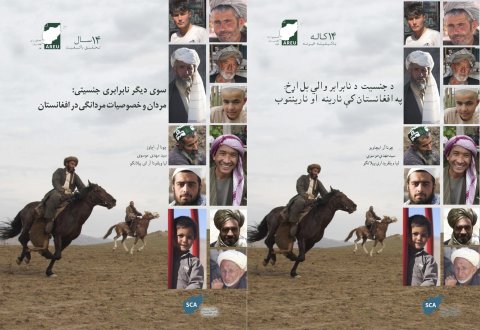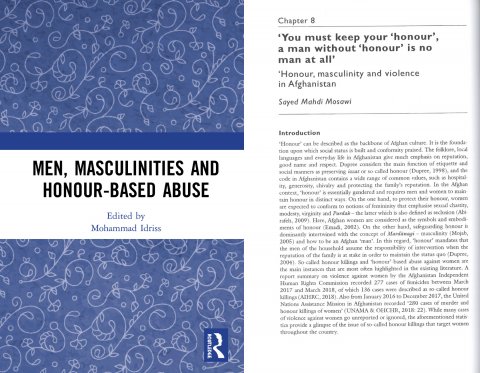


This review article offers an overview of the literature relating to men and masculinities in Afghanistan. Relying on the scholarly works, it synthesizes the development of the field, reflecting a chronological and thematic order. Knowing about masculinities fields in non-western contexts can provide different insights into current discourse, which is mainly dominated by white masculinity.
Afghanistan is a multi-ethnic and multi-cultural country, being geographically located at the intersection of South Asia, Central Asia, and the Middle East. For almost four decades, the country has been plagued with war and conflict, resulting in a poor economy. Men and masculinities is a relatively new and emerging field in Afghanistan, flourishing in the years since the US-led military intervention in 2001.
After the fall of the Taliban regime and provision of post-conflict support by international funders, gender and women’s rights compromised the main pillar of the reconstruction activities. The new changes included a dramatic expansion of studies on gender, however, efforts predominantly focused on women's issues. In the 2000s, only a few works drew attention to masculinity. Three streams, in particular, can be identified based on these preliminaries. Firstly, benefiting from gender and feminist perspectives, some studies perceived Afghan manhood as a source of the problems hindering the promotion of women’s rights. For instance, Gilani (2008) and Ahmed-Ghosh (2012) argue that, in Afghanistan, the long episodes of war and conflict reinforced men to reassert their masculinity through to use of violence against and subordination of women. Secondly, some scholars from the same field promoted the necessity of involving men in gender intervention programs and projects (Abirafeh, 2007, 2009; Azarbaijani-Moghaddam, 2009; Zahedi, 2011). The third contribution of this early scholarship involved anthropological accounts of the migration of young Afghans as a rite-of-passage to manhood (Monsutti, 2007).
Sparked by the early works, men and masculinities, in recent years, has become a central focus in a growing literature in Afghanistan. Some studies took a critical approach towards gender mainstreaming from the west that led to men’s opposition to equality, because the imported schemes failed to take note of men’s attitudes and voices (Bahri, 2014; Mosawi, 2015). Such an emphasis re-visits the concept of men and masculinity not being the problem but, most importantly, being part of the solution for gender inequality (Mosawi, 2017a, 2017b).
Explorations of what it means to be a man and masculinity’s status in a post-conflict context are another important contribution. Echavez, Mosawi, and Pilongo, in their 2016 study, reveal the expectations that society sets for Afghan men, such as being the main breadwinners of the family, Nafaqa (i.e. maintenance) providers, safeguarders and decision-makers, and also the corresponding consequences when these expectations are not met. However, as other researchers outline, attending to these traditional roles is highly challenging for men in Afghanistan, particularly considering the ongoing conflict, insecurity, financial and political instability, and insurgency within the country (Gereš, 2018; Myrttinen, 2018).
The most recent research projects aim to fill a large gap in the literature by highlighting men’s experiences of violence. For example, Chiovenda (2018), in his ethnographic work, analyzes the impact of war on Pashtun men and the changes in masculine notions. According to him, several models are needed to illustrate masculinity among Pashtun men in eastern part of Afghanistan as there are new notions competing against the pre-war notions. In another example, Mosawi, in his 2020 case study, pays attention to Afghan men, not as the perpetrators, but as the victims of gender-based violence. Using the example of honor-based violence, he shows that honor-based abuse is evident, normalized and misrecognized in the everyday lives of participant men, and that they are subjected to killings and harmful traditional practices including forced cousin marriage and early boy child marriage.
The scholarship described here, as well as the further literature listed under “Further reading” below, shows that the field of scholarship on men and masculinities in Afghanistan is well underway. It is still developing, and there are constructive gaps that need to be theoretically, methodologically and contextually filled by further research in the coming years.
Notes
SUGGESTED CITATION: Mosawi, S. M. (2020). Men and Masculinities Scholarship in Afghanistan: An Overview of the Evolution of the Field. XYonline, April 16, 2020. URL: https://xyonline.net/content/men-and-masculinities-scholarship-afghanis…
BIONOTE: Sayed Mahdi Mosawi, PhD, is a Research Fellow at the Institute for Advanced Study in the Humanities (Kulturwissenschaftliches Institut Essen (KWI), Germany. Email: mahdimosawi@gmail.com. Twitter: @sm_mosawi.
Bibliography
Abirafeh, L. (2007). An Opportunity Lost? Engaging Men in Gendered Interventions: Voices from Afghanistan. Journal of Peacebuilding & Development, 3(3), 82-87. doi:10.1080/15423166.2007.369594243172
Abirafeh, L. (2009). Gender and International Aid in Afghanistan : the Politics and Effects of Intervention. Jefferson, N.C.: McFarland & Co.
Ahmed-Ghosh, H. (2012). Afghan Women Stranded at the Intersection of Local and Global Patriarchies. In A. Chatterji & L. Chaudhry (Eds.), Contesting Nation: Gendered Violence in South Asia: Notes on the Post-Colonial Present. New Delhi: Zubaan.
Azarbaijani-Moghaddam, S. (2009). Manly Honor and the Gendered Male in Afghanistan Viewpoints Special Edition. Afghanistan 1979-2009: In the Grip of Conflict (pp. 184-187). Washington, D.C.: The Middle East Institute.
Bahri, J. (2014). Western Gender Policies in Afghanistan: Failing Women and Provoking Men. Gender, Technology and Development, 18(2), 163-185. doi:10.1177/0971852414529480
Chiovenda, A. (2018). “The War Destroyed Our Society”: Masculinity, Violence, and Shifting Cultural Idioms among Afghan Pashtuns. In M. N. Shahrani (Ed.), Modern Afghanistan: The Impact of 40 Years of War (pp. 179-199). Bloomington, Indiana: Indiana University Press.
Echavez, C. R., Mosawi, S. M., & Pilongo, L. W. R. (2016). The Other Side of Gender Inequality: Men and Masculinities in Afghanistan. Kabul: Afghanistan Research and Evaluation Unit. Also Retrievable in local languages: Dari/Afghan Persian and Pashto.
Gereš, N., Heilman, B., Hashimi, S. I., Kakar, R., Kelberg, M., Hakobyan, L., El Feki, S., And Barker, G. (2018). Reflections on Gender, Patriarchy, and Peace: Results from the International Men and Gender Equality Survey (IMAGES) in Afghanistan. Washington, DC: Promundo-US, UN Women, and Global Affairs Canada.
Gilani, S. (2008). Reconstituting Manhood: Examining Post-Conflict Remasculinisation and its Effects on Women and Women’s Rights in Afghanistan. In-Spire: Journal of Law, Politics and Societies, 3(2), 53-71. Retrieved from http://sro.sussex.ac.uk/id/eprint/52012/
Monsutti, A. (2007). Migration as a Rite of Passage: Young Afghans Building Masculinity and Adulthood in Iran. Iranian Studies, 40(2), 167-185. https://doi.org/10.1080/00210860701276183
Mosawi, S. M. (2015). “Gender Neither Ours Nor From Our Culture, West Countries Brought It To Us” Challenges of Engaging Afghan Men in Gender Equality: A Case Study in Kabul, Afghanistan”. presented at the American Men's Studies Association (AMSA) XXIII / International Conference on Masculinities Engaging Men and Boys for Gender Equality, New York.
----------------- (2017a). Mardān-e Afqān va Hoquq-e Zanān: Mas’ala yā Rāh-i Hal? (Afghan Men and Women's Rights: The Problem or the Solution?). London: BBC.
----------------- (2017b). Reducing ‘Gender’ to ‘Women’ is Problematic. Kabul: Afghanistan Research and Evaluation Unit.
----------------- 2020. "‘You Must Keep Your ‘Honour’, a Man without ‘Honour’ is no Man at All’ : ‘Honour, Masculinity and Violence in Afghanistan." In Men, Masculinities and Honour-Based Abuse, edited by Mohammad Mazher Idriss, 128-149. Oxon and New York: Routledge. https://doi.org/10.4324/9780429277726-8
Myrttinen, H. (2018). Navigating Norms and Insecurity: Men, Masculinities, Conflict and Peacebuilding in Afghanistan. International Alert & Peace Training and Research Organisation. Retrieved from https://www.international-alert.org/sites/default/files/Afghanistan_MasculinitiesConflictPeacebuilding_EN_2018.pdf
Zahedi, A. (2011). When the Picture Does Not Fit the Frame: Engaging Afghan Men in Women’s Empowerment. In J. Heath & A. Zahedi (Eds.), Land of the Unconquerable The Lives of Contemporary Afghan Women (pp. 293-308). California & London: University of California Press.
Further Readings
Ahmadi, B., & Stanikzai, R. (2018). Redefining Masculinity in Afghanistan (No. 243). Washington, D.C.: United States Institute of Peace. Retrieved from : https://www.usip.org/sites/default/files/2018-02/pb243-redefining-masculinity-in-afghanistan.pdf
British & Irish Agencies Afghanistan Group (BAAG). (2014). Getting it Right: Examining Gender Programming in Afghanistan. Retrieved from: http://www.baag.org.uk/sites/www.baag.org.uk/files/resources/attachments/Getting%20it%20Right%202014_FINAL.pdf
Chiovenda, A. (2020). Crafting Masculine Selves : Culture, War, and Psychodynamics among Afghan Pashtuns. New York, NY: Oxford University Press.
Duncanson, C. (2013). Forces for Good? Military Masculinities and Peacebuilding in Afghanistan and Iraq. Hampshire & New York: Palgrave Macmillan.
Manchanda, N. (2014). Queering the Pashtun: Afghan Sexuality in the Homo-nationalist Imaginary. Third World Quarterly, 36(1), 130-146. doi:10.1080/01436597.2014.974378
Myrttinen, H. (2017). Depictions and Reflections: Photographing Visualizations of Masculinities in Afghanistan and Democratic Republic of the Congo. International Feminist Journal of Politics, 19 (4), 530-536. doi:10.1080/14616742.2017.1364910
Pilongo, L. W. R., Echavez, C. R., Tufail, P., & Mosawi, S. M. (2016). A Closer Look at Men and "Masculinities": Their Proactive Contribution to Gender Equality. Kabul: Afghanistan Research and Evaluation Unit.